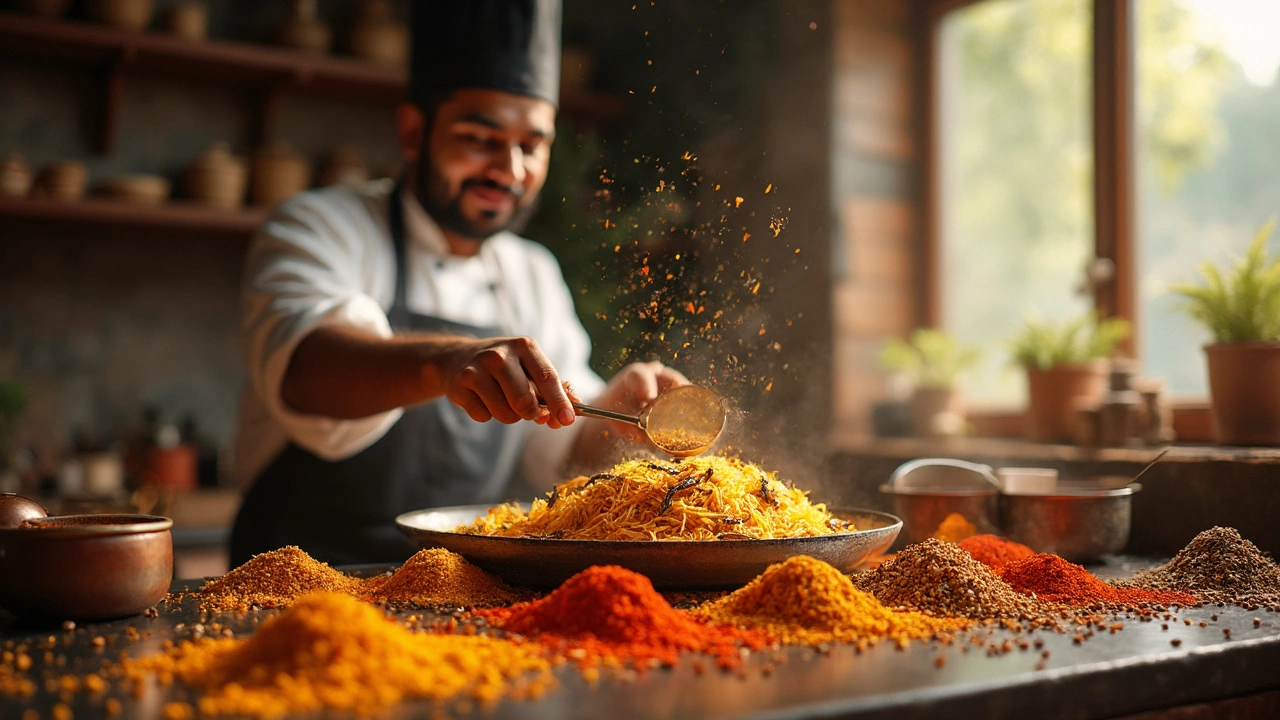What Causes Bitterness in Biryani?
 Feb, 7 2025
Feb, 7 2025
Biryani, a culinary adventure on your plate, can sometimes surprise you with a bitter note that doesn't quite belong. So, what gives biryani that unwelcome bitterness? It's usually some sneaky spices playing tricks.
Cloves, cumin seeds, or certain masalas, if overcooked or burnt, can introduce a bitter taste. Toss in a dash too much of these, or let them simmer for longer than they should, and bam! You've got an uninviting twist to your dish.
If you're aiming for that perfect flavor, it's all about balance and timing. Getting the spice mix right, knowing when to add them, and how long to let them cook is key. We'll dive into the specifics of each ingredient and explore some useful insights on how to avoid turning your biryani into a bittersweet memory.
- Understanding Biryani Flavors
- Common Ingredients and Their Roles
- Identifying the Bitter Culprits
- Cooking Tips to Avoid Bitterness
- Adjusting Flavors to Perfection
- Common Mistakes in Biryani Cooking
Understanding Biryani Flavors
Biryani isn't just a dish; it's an experience of aroma and taste, hitting all the right notes—salty, spicy, tangy, and even a hint of sweetness. But if its harmony gets thrown off, things can get a bit bitter — literally. So how do these flavors come together?
Essential Spices and Herbs
At the heart of any good biryani are the spices, and understanding their roles is key to avoiding bitterness. Cloves, often used whole, add warmth but can get overpowering if used excessively. Then there's cumin; its earthy flavor is brilliant but needs to be just right.
Besides, we've got cardamom for some sweet and spicy notes, and let's not forget about the colors that tantalize the eyes first — turmeric and saffron!
The Symphony of Rice and Meat
The rice and meat form the biryani's body but the flavor happens with layers mixed with those fragrant spices. A spoonful of ghee or oil lets spices distribute evenly, giving each bite that beautiful blend of taste.
Balancing the Bitterness
Bitterness often sneaks in when spices are burnt or too toasty. The trick is in the timing. As a rule of thumb, add your cardamom and cloves early with the oil, so they infuse flavors gently. Cumin seeds can go in after onions start to brown, releasing their distinct aroma without getting charred.
Next time you set out to make this beloved dish, remember, it’s all about the order, quantity, and attention to detail. Following these tips not only avoids bitterness but also elevates the biryani to its deserved glory.
Common Ingredients and Their Roles
Biryani, despite its complexity, owes its fame to a handful of star players. These ingredients each bring a unique flavor, aroma, and even the texture to the dish, creating that beloved harmony in every bite.
Rice: The Backbone
It's all about that long-grained basmati rice in a traditional biryani. The fluffiness and fragrance come from this base ingredient. Cooking it just right is crucial. Overcooked rice becomes mushy and loses its charm, while undercooked rice can ruin the whole dish's mouthfeel.
Protein: Meat, Fish, or Veggies
Chicken, mutton, fish, or even vegetables are often used as the centerpiece. Each variant offers a different experience in terms of texture and flavor. Depending on your choice, marination plays a big role in infusing additional taste.
Spices and Aromatics
This is where the magic happens! Imagine biryani without its spices; the thought alone is bland. Commonly used spices like cumin, coriander, cloves, and cardamom bring depth and warmth. If not managed well, they can mess with the flavor balance, sometimes adding unwanted bitterness.
- Cumin: Adds a nutty flavor, but should be used with caution to prevent overpowering.
- Cardamom: Offers sweet-spicy notes, best when used in moderation.
- Cloves: Known for intense aroma, they can introduce a bitter taste if overused.
Onions and Tomatoes
These aren't just there for bulk. Onions contribute sweetness and depth once caramelized, while tomatoes add tanginess that cuts through the richness. Get them right, and they elevate the entire dish.
Herbs: The Fresh Garnish
Mint and coriander aren't just garnish but add a fresh punch and a burst of color. These herbs should be added towards the end to maintain their vibrant flavor and aroma.
Each of these ingredients plays a role, and balancing them well is key to mastering your biryani recipe. Understanding how each works can ensure your search for the perfect biryani isn't marred by unwanted bitterness or any other mishap.
Identifying the Bitter Culprits
When it comes to perfecting biryani, identifying which ingredients can turn the dish bitter is crucial. Understanding these components not only helps avoid pitfalls but ensures your biryani remains the flavorful masterpiece it's meant to be.
Cloves: The Overpowering Spice
Cloves are a common ingredient in biryani, known for their pungent aroma. However, overusing or burning them can lead to an unwelcome bitterness. They should be used sparingly, as their strong essence can dominate subtle flavors. A few can work wonders, but more can tip the balance towards bitter.
Cumin Seeds: Small but Potent
Cumin seeds bring an earthy taste to biryani. Toasting them is essential to release their flavor, but it's a fine line between toasting and burning. A mere moment too long in the pan can turn their nuttiness into a sharp, bitter taste.
Masalas: Pre-packaged Risks
Many cooks rely on pre-packed masalas for convenience, but these mixes can be tricky. Some might have dominant spices that don't play well when used in large quantities. It’s crucial to know what’s in your masala. If in doubt, start with less than the suggested amount and build up if necessary.
Burnt Onions: Not So Sweet
Onions are caramelized to add a sweet depth to biryani, but take them too far and they can bring a bitter tinge. The same goes for garlic and ginger when overcooked. Keeping a close eye and stirring often helps avoid this slip-up.
Cook Smarter, Not Harder
Keeping bitterness at bay means cooking smarter, and not just harder. Start by having a set of measuring spoons to keep track of spice proportions. Keep your pan on medium heat to prevent burning, and be attentive when toasting spices. Mastering timing and spice management goes a long way.

Cooking Tips to Avoid Bitterness
Alright, let's get into how you can keep that unwanted bitter taste out of your biryani. It’s all about smart spice management and timing, my friends.
Spice Timing and Treatment
One of the golden rules is to ensure your spices like cloves and cumin are lightly toasted and not burnt. Burnt spices can be the prime source of that bitterness you're trying to dodge. When you roast them, just go for a nice aroma instead of a dark color. Trust your nose over your eyes!
Watch Your Heat Levels
Avoid cooking on high heat, especially when frying spices in oil or ghee. Medium heat is your best friend. This allows spices to release their aromatic oils without scorching.
Check the Clove and Cardamom Count
Cloves and cardamom are small but mighty. Adding too many can overpower your dish with a bitter kick. Usually, for a family-sized serving, a few pieces are more than enough. Remember, you can always add more later, but you can't take them out once mixed.
Balance with Fresh Ingredients
Using fresh ingredients can counterbalance any slight bitterness. Incorporate fresh tomatoes, herbs like mint or cilantro, and a splash of lemon juice towards the end of cooking. These add brightness and mask minor bitterness.
Use Quality Biryani Masala
Pre-made masalas can sometimes have lower quality mixes. Opt for renowned brands or make your own mix to ensure quality and flavor without any off-tastes.
By paying attention to these aspects, you're setting yourself up for a biryani triumph, each time. Also, here’s a quick bonus tip: taste as you go along. It’s your best tool for catching bitterness before serving!
Adjusting Flavors to Perfection
Achieving that dreamy balance in your biryani requires a bit of practice and some know-how. Fixing bitterness is very doable, and it begins with understanding your ingredients. Let's break it down!
Control Your Spice Game
To dodge bitterness, get familiar with the personality of each spice. Some are strong-willed, like cloves and cumin, and they need gentle handling. Use them with care and never overheat them. They burn quickly, so stick to medium heat.
Timing and Sequence Matter
This might be a surprise, but the order in which you add spices can make a big difference. Start with whole spices in hot oil, but don't add powdered ones until you've added your meat or veggies. This prevents them from burning and releasing bitter flavors.
Taste and Adjust
Always taste your biryani as you cook. This isn't just for fun; it's key to adjusting flavors on the go. Don't be shy about tweaking spices as needed. If bitterness sneaks in, a splash of lemon juice or a pinch of sugar can help reset the taste.
Mind the Marination
Ever noticed biryani recipes talking about marinating the meat? It's not just for show. A good marination in yogurt and spices breaks down proteins and allows flavors to seep in without overpowering.
- Marinate at least a minimum of 30 minutes.
- Balance the spices with ingredients like yogurt to mellow harsh notes.
By paying attention to these details, you'll start noticing a big improvement in your biryani's flavor profile. So next time you're at the stove, remember: a little attention to detail goes a long way in making biryani magical!
Common Mistakes in Biryani Cooking
Cooking biryani might seem like an art form, but it's not as daunting as it appears. Yet, missteps can easily ruin the dish. Let's explore some typical blunders you might encounter in the kitchen.
Overzealous with the Spices
One common error is going overboard with spices. The allure of adding extra cloves or cumin can be tempting, but it’s crucial to remember that these spices pack a punch; too much can turn the taste from aromatic to bitter.
"A true biryani brings harmony to varied spices. It’s all about balance," says culinary expert Sameer Ali.
Timing Errors
Another mistake is poor timing. Adding certain ingredients too early or too late can affect both flavor and texture. For example, fried onions need adequate time to caramelize, enhancing sweetness rather than bitterness.
Improper Rice Preparation
Ever ended up with clumpy rice? That's often due to skipping the soaking step or not paying attention to boiling. A good soak for about 30 minutes helps each grain cook separately, ensuring fluffy rice.
Disregarding the Layering Technique
Layering is what distinguishes biryani from other rice dishes. Improper layering fails to distribute flavors evenly throughout the dish. Always start with a layer of cooked rice, followed by your meat or vegetables, topped with more rice.
- Use basmati rice for the best results.
- Pre-cook the meat or vegetables for a balanced texture.
- Seal the pot properly to trap the aroma.
Neglecting the Resting Phase
Once it's off the heat, let your biryani rest. This phase allows flavors to meld and strengthen. Cutting this short can result in a dish that has yet to reach its full potential in flavor.
Avoid these pitfalls, and you'll be well on your way to crafting biryani that not only avoids unwanted bitterness but also captures that signature blend of rich, inviting flavors.